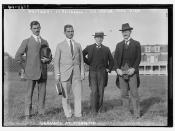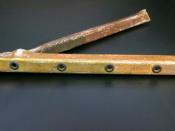The First World War, from 1914 to 1918 makes its case in history as one of the bloodiest wars ever. Over 21 million people died as a result. Yet this war was suppose to be a short war, one with minimal causalities that was suppose to end in months, even weeks. But the individuals most involved with the war who first envisioned this "short war" are also the ones that refused to let it come to an end. People from both Central Power, both Germany and Austria-Hungry had great responsibility to the length of this war. Even though pretty much everyone in Europe was involved in the war, it could be argued that this war was conducted by and for a few individual's dream of conquest. In his book The First World War Germany and Austria-Hungary 1914-1918, Holger H. Herwig does a fantastic job of showing the idiosyncrasies of the individual.
Germany's Kaiser, Wilhelm II needed to shoulder most of the blame even though he played a relative small part in the affair. As the monarch of the country that started the war, his responsibility was the greatest. He became Supreme Commander of the German Forces on the 18th of August 1914 . Even though he became "Supreme War Lord", Wilhelm actions only included "played at war" told "gruesome tales of battle" and "demanded that his troops 'take no prisoners'". Wilhelm's role diminished even more as the war progressed, his duties soon "consisted largely in distributing bottles of pink 'victory' champagne to victorious generals." Although most of the decisions were kept from him on purpose, he still should have acted more 'Kingly' and made more of an effort to contribute to the war, for better or for worst, at least it would have been the King's (or Kaiser's) war to...


